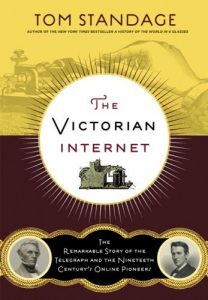 I’m at least three books behind in my reviews, so I figured I’d bang out a fun one today: The Victorian Internet: The Remarkable Story of the Telegraph and the Nineteenth Century’s On-line Pioneers by Tom Standage. This 1998 book is now a classic – written as the Web was exploding on the scene, it reminded us that this movie has run before, 150 years in the past, with the rise of the telegraph. He writes:
I’m at least three books behind in my reviews, so I figured I’d bang out a fun one today: The Victorian Internet: The Remarkable Story of the Telegraph and the Nineteenth Century’s On-line Pioneers by Tom Standage. This 1998 book is now a classic – written as the Web was exploding on the scene, it reminded us that this movie has run before, 150 years in the past, with the rise of the telegraph. He writes:
The rise and fall of the telegraph is a tale of scientific discovery, technological cunning, personal rivalry, and cutthroat competition. It is also a parable about how we react to new technologies: For some people, they tap a deep vein of optimism, while others find in them new ways to commit crime, initiate romance, or make a fast buck age- old human tendencies that are all too often blamed on the technologies themselves.
Standage chronicles the history of the telegraph’s many inventors (Morse was just the most famous “father” of the device), and the passions it stirred across the world. Nowhere, however, did the invention stir more excitement (or bad poetry) than in the United States, where it can be convincingly argued that the telegraph’s ability to conquer distance and time almost perfectly matched the young country’s need to marshall its vast geography and resources. Were it not for the telegraph, the United States may never have become a world power.
Expansion was fastest in the United States, where the only working line at the beginning of 1846 was Morse’s experimental line, which ran 40 miles between Washington and Baltimore. Two years later there were approximately 2,000 miles of wire, and by 1850 there were over 12,000 miles operated by twenty different companies. The telegraph industry even merited twelve pages to itself in the 1852 U.S. Census. “The telegraph system [in the United States] is carried to a greater extent than in any other part of the world,” wrote the superintendent of the Census, “and numerous lines are now in full operation for a net-work over the length and breadth of the land.” Eleven separate lines radiated out from New York, where it was not uncommon for some bankers to send and receive six or ten messages each day. Some companies were spending as much as $1,000 a year on telegraphy. By this stage there were over 23,000 miles of line in the United States, with another 10,000 under construction; in the six years between 1846 and 1852 the network had grown 600-fold.
Standage writes with the amused eye of a British citizen – he currently works for the Economist as digital editor. One can sense a bit of English envy as he tells the telegraph’s tale – just as with television, the telegraph had early roots in his native country, but found its full expression in the United States. Thomas Edison started his career as a “telegraph man,” Alexander Graham Bell was inspired by the invention, the Associated Press grew out of the telegraph’s impact on newspapers, “e-commerce” was invented across the device’s wires, and huge corporations were born from its industries – Cable & Wireless, for example, began as a company that sourced insulation for telegraph lines.
The Victorian Internet is a must read for anyone interested in the history of technology, and in the cycles of hype, boom, and bust that seem to only quicken with each new wave of innovation. Highly recommended.
Other works I’ve reviewed:
Year Zero: A Novel by Rob Reid (review)
Lightning Man: The Accursed Life of Samuel F. B. Morse by Kenneth Silverman (review)
Code: And Other Laws of Cyberspace, Version 2.0
You Are Not a Gadget: A Manifesto (Vintage)
WikiLeaks and the Age of Transparency
Republic, Lost: How Money Corrupts Congress–and a Plan to Stop It
Where Good Ideas Come From: A Natural History of Innovation by Steven Johnson (my review)
The Singularity Is Near: When Humans Transcend Biology by Ray Kurzweil (my review)
The Corporation (film – my review).
What Technology Wants by Kevin Kelly (my review)
Alone Together: Why We Expect More from Technology and Less from Each Other
The Information: A History, a Theory, a Flood
In The Plex: How Google Thinks, Works, and Shapes Our Lives
The Future of the Internet–And How to Stop It
The Next 100 Years: A Forecast for the 21st Century
Physics of the Future: How Science Will Shape Human Destiny and Our Daily Lives by the Year 2100
DIGITAL JUICE


No comments:
Post a Comment
Thank's!